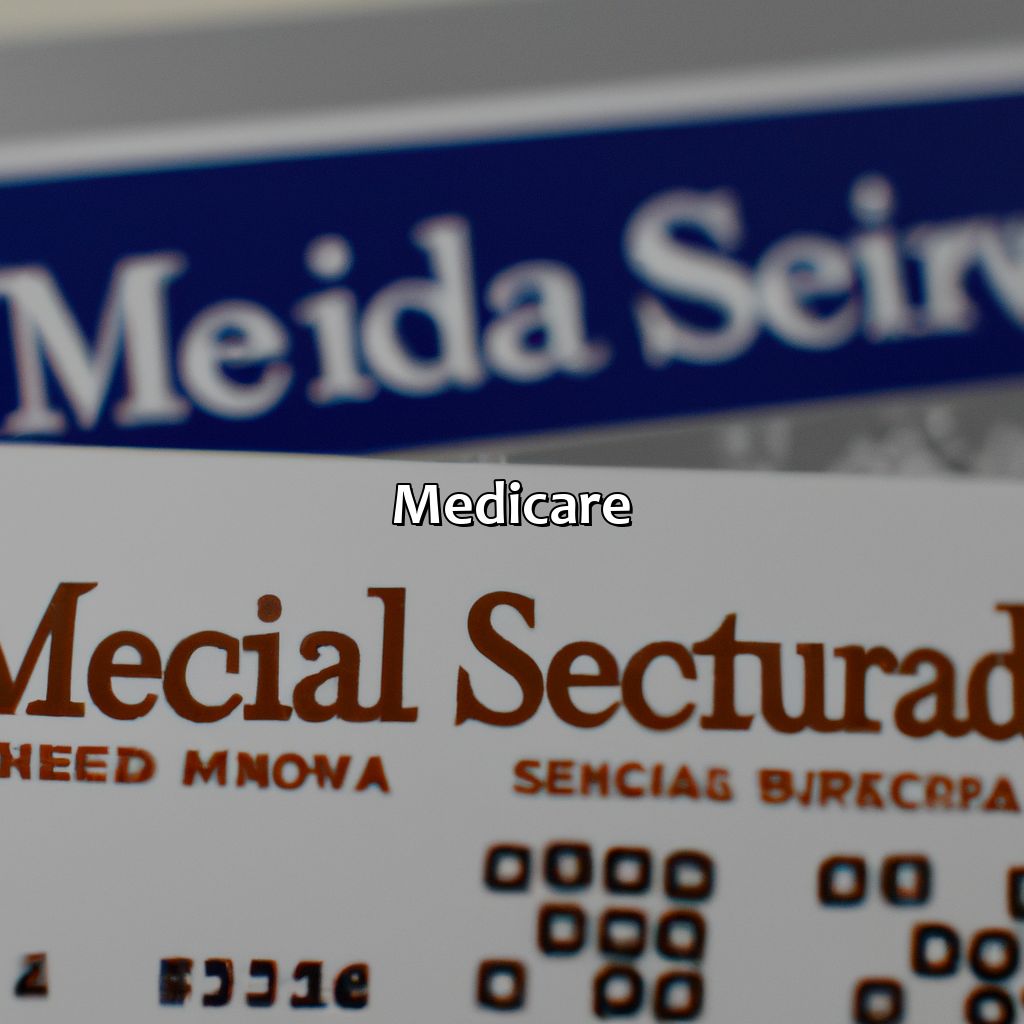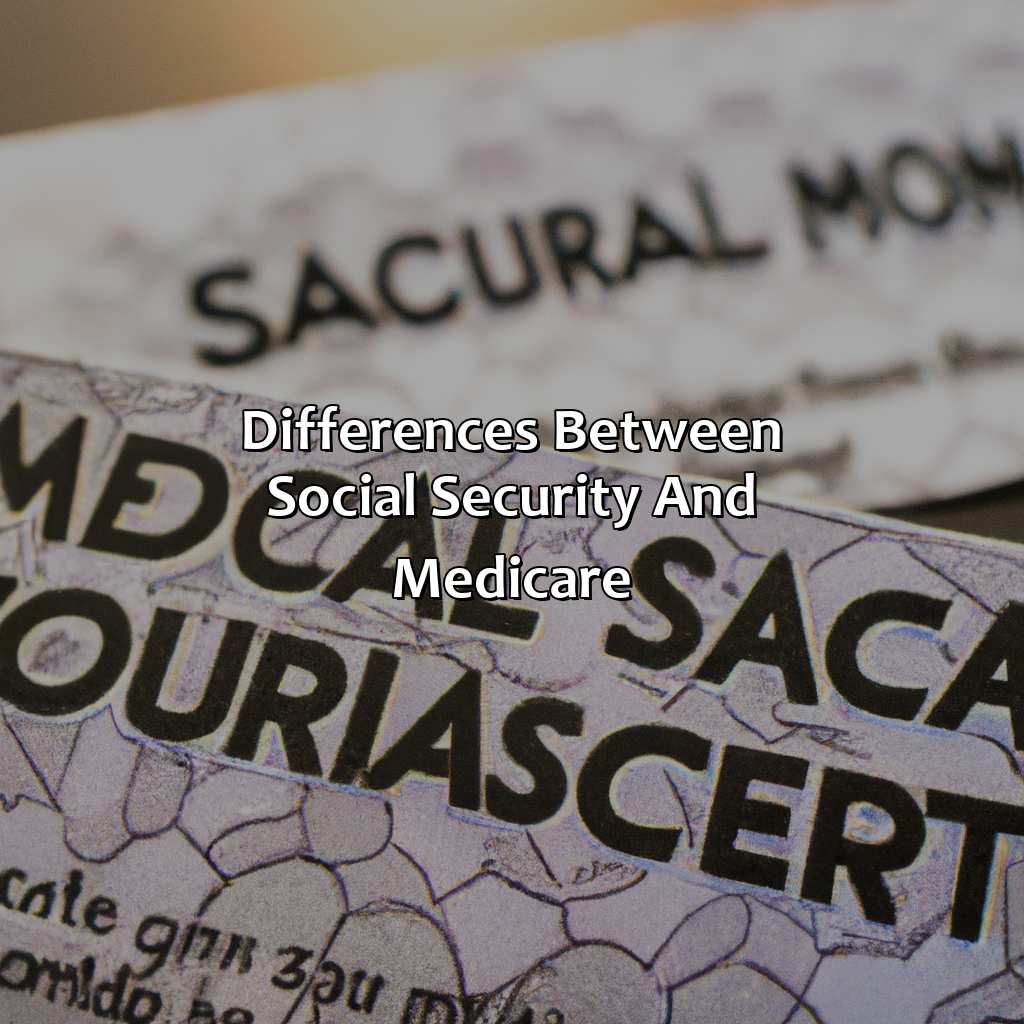What Are Social Security And Medicare?
Key Takeaway:
- Social Security is a government program that provides financial support to eligible individuals who have reached retirement age or become disabled. It is meant to secure a basic level of income for those who have worked and paid into the system.
- Medicare is a government program that provides health insurance to eligible individuals who are 65 or older, as well as some younger individuals with disabilities. It is meant to ensure that people have access to necessary medical services without incurring excessive costs.
- The main difference between Social Security and Medicare is their purpose and focus. Social Security provides financial support, while Medicare provides healthcare coverage. Additionally, Social Security is funded through payroll taxes, while Medicare is funded through a combination of taxes and premiums paid by beneficiaries.
Do you have questions about Social Security and Medicare? With this blog, you’ll get a clear understanding on how these essential programs work and how they can help you. Find out more about the benefits and eligibility criteria of Social Security and Medicare.
Social Security
It is essential to comprehend Social Security better. To do that, let’s explore its sub-sections – Definition, Purpose, Eligibility and Benefits. This will offer a complete understanding of Social Security and how it runs.

Image credits: retiregenz.com by Joel Washington
Definition and Purpose
Social Security and Medicare are essential social welfare programs in the United States. Social Security is a federal benefit program designed to provide financial assistance to those who have reached retirement age, become disabled, or lost a family member. The purpose of these programs is to provide financial support and a safety net for those in need, ensuring basic needs such as healthcare, income replacement, and basic living expenses.
Medicare is a national health insurance program designed to provide healthcare coverage for individuals aged 65 or older. It covers medical expenses such as hospital stays, doctor visits, and prescription drugs. The program also covers younger individuals with specific disabilities or chronic conditions requiring medical attention.
These programs are funded through payroll taxes paid by employers and employees. The goal is to ensure that everyone has some level of support during times of need.
Additionally, Social Security recipients are required to receive the funds electronically by direct deposit into their personal bank accounts. This requirement ensures swift payment processing and timely receipt of benefits for eligible recipients.
Why worry about retirement when you can just rely on Social Security and Medicare to disappoint you instead?
Eligibility and Benefits
To be eligible for social security and Medicare, one must meet specific requirements and benefits. These include aging criteria, certain disabilities, and citizenship status. The benefits of these programs include financial assistance for retirement, medical insurance, disability payments, and survivor’s income.
- Aging Criteria: Individuals over the age of 62 can apply for social security benefits.
- Disability: People with certain disabilities can receive social security disability income (SSDI) or supplemental security income (SSI).
- Citizenship Status: Only U.S citizens and lawful permanent residents are entitled to these benefits.
It is essential to know that the programs’ eligibility criteria and benefit ranges vary from person to person based on their work history. It is best to consult a qualified professional or SSA representative to understand the options available to you.
Pro Tip: Ensure that you stay informed about any changes in the social security program or medicare benefits that may impact your eligibility criteria or benefit range.
“I’m not saying Medicare is a gift from the government, but it’s definitely the kind of gift that comes with a receipt for when you need to return it.”
Medicare
Do you want to comprehend Medicare? To do so, you have to be aware of its definition, objective, and parts. This section will give you a swift summary of both sub-sections. It’ll help you get a full understanding of the Medicare insurance plan.

Image credits: retiregenz.com by Adam Jones
Definition and Purpose
Social Security and Medicare are federal programs that provide financial assistance and healthcare coverage to eligible individuals in the United States. Social Security is a retirement, disability, and survivor benefits program for workers and their families. On the other hand, Medicare provides health insurance to people who are 65 years or older and some younger people with disabilities.
Medicare covers services such as hospitalization, doctor visits, prescription drugs, and preventative care. Once a person becomes eligible for Medicare, they can choose between Original Medicare or a Medicare Advantage Plan offered by private insurance companies.
It is important to note that while both programs are funded through taxes paid by workers, they serve different purposes. Social Security aims to provide income support when individuals retire or become disabled, while Medicare aims to help with medical costs in retirement.
A study conducted by the Kaiser Family Foundation found that in 2020, nearly 65 million Americans relied on either Social Security or Medicare benefits. Medicare has more parts than a Lego set, but hopefully less painful to step on.
Parts of Medicare
Medicare is a social security program that offers healthcare benefits to eligible individuals. It consists of various segments or entities which are essentially there to provide different types of coverage to its beneficiaries.
- Original Medicare – This plan provides basic medical coverage, such as hospital stays, doctor visits and medical equipment.
- Medicare Advantage – This health plan option combines Part A, Part B and usually drug coverage into one single program.
- Medicare Part D – This is a prescription drug coverage policy whereby individuals pay premiums for medications in their health plans, according to their needs and preferences.
- Medigap – A private insurance plan that covers the out-of-pocket expenses that Original Medicare doesn’t cover including deductibles, coinsurance and copayment.
It is important to note that each segment has its peculiarities targeting the different areas of an individual’s healthcare needs. Additionally, depending on the choices made by the beneficiary concerning which part to participate in, this can affect their overall coverage.
Don’t miss out on your opportunity to understand which parts you are eligible for and what benefits you qualify for – learn about Medicare today!
Why worry about retirement when you have Social Security and Medicare to argue over?
Differences between Social Security and Medicare
To grasp the distinction between Social Security and Medicare, you must grasp their funding and coverage. In this section, we’ll explain what makes them different regarding funding and coverage. So you can have a better understanding of these vital programs.

Image credits: retiregenz.com by Harry Woodhock
Funding
Social Security and Medicare are two distinct programs that offer benefits to eligible recipients. Social Security is funded through payroll taxes while Medicare is funded through a combination of payroll taxes, premiums, and general revenue.
Medicare Part A is mainly funded by payroll taxes whereas Part B and D are primarily financed through premiums paid by the beneficiaries. Additionally, Medicare Advantage plans are funded through a combination of insurance premiums and contributions from the federal government.
Furthermore, it’s essential to note that the funding for both programs faces long-term financial challenges that require immediate attention from policymakers. It’s critical for individuals to educate themselves on these issues to make informed decisions regarding their benefits.
Pro Tip: Understanding the differences in funding sources between Social Security and Medicare can help individuals plan for retirement appropriately.
Coverage may differ, but at least both Social Security and Medicare cover the essentials: retirement and medical expenses, aka ‘things you’ll never be able to afford after years of paying taxes’.
Coverage
Social Security and Medicare are two government programs that provide coverage to individuals in different ways. Social Security provides retirement, disability, and survivor benefits, while Medicare provides health insurance to those 65 years and older or with certain disabilities.
Medicare covers a wide range of healthcare services such as hospital stays, doctor visits, prescription drugs and preventative care. On the other hand, Social Security provides financial assistance to retirees, as well as those who are disabled or have lost loved ones.
It is important to note that enrolling in Medicare is mandatory for eligible individuals while signing up for Social Security benefits is voluntary. Additionally, while most people pay into the Social Security system throughout their working lives, Medicare is funded through payroll taxes and premiums paid by enrollees.
Make sure to understand the differences between these programs by researching eligibility requirements and coverage options. Don’t miss out on the benefits you may be entitled to!
Five Facts About Social Security and Medicare:
- ✅ Social Security is a federal program designed to provide income support to retired, disabled, or surviving eligible individuals. (Source: SSA.gov)
- ✅ Medicare is a federal health insurance program for people who are 65 or older, certain younger people with disabilities, and people with End-Stage Renal Disease (ESRD). (Source: Medicare.gov)
- ✅ To qualify for Social Security benefits, you must earn enough Social Security credits by paying Social Security taxes while working. (Source: SSA.gov)
- ✅ Medicare is funded by taxpayer contributions, premiums from beneficiaries, and federal government funding. (Source: Medicare.gov)
- ✅ Social Security and Medicare are important safety net programs that help millions of Americans meet their basic needs in retirement or in times of illness, injury, or disability. (Source: AARP)
FAQs about What Are Social Security And Medicare?
What are Social Security and Medicare?
Social Security and Medicare are two federal programs that provide assistance to Americans. Social Security provides retirement, disability, and survivor benefits, while Medicare offers health insurance to those over 65 or with certain disabilities.
How are Social Security and Medicare funded?
Social Security and Medicare are primarily funded through payroll taxes. Employees and employers each contribute 6.2% of taxable earnings toward Social Security, while Medicare is funded by a 1.45% tax from both employees and employers.
Can everyone receive Social Security and Medicare benefits?
No, not everyone is eligible for Social Security and Medicare benefits. Social Security benefits are available to those who have earned enough work credits over their lifetime, while Medicare is available to those over 65 or with certain disabilities and medical conditions.
What are the benefits of Social Security?
The benefits of Social Security include retirement benefits, disability benefits, survivor benefits, and supplemental security income. These benefits provide financial assistance to those who have worked and paid into the program over their lifetime.
What does Medicare cover?
Medicare covers a variety of medical expenses, including hospital stays, doctor visits, medical tests, and some prescription drugs. It also offers preventative services such as flu shots and cancer screenings.
How do I apply for Social Security and Medicare benefits?
You can apply for Social Security benefits online, by phone, or in person at a Social Security office. To apply for Medicare, you can visit the Social Security website or call their toll-free number. You can also sign up during the Medicare enrollment period.


